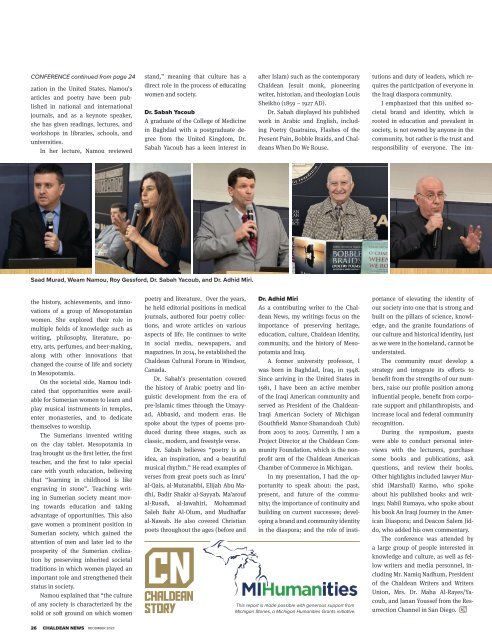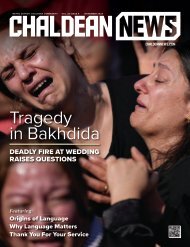Create successful ePaper yourself
Turn your PDF publications into a flip-book with our unique Google optimized e-Paper software.
CONFERENCE continued from page 24<br />
zation in the United States. Namou’s<br />
articles and poetry have been published<br />
in national and international<br />
journals, and as a keynote speaker,<br />
she has given readings, lectures, and<br />
workshops in libraries, schools, and<br />
universities.<br />
In her lecture, Namou reviewed<br />
stand,” meaning that culture has a<br />
direct role in the process of educating<br />
women and society.<br />
Dr. Sabah Yacoub<br />
A graduate of the College of Medicine<br />
in Baghdad with a postgraduate degree<br />
from the United Kingdom, Dr.<br />
Sabah Yacoub has a keen interest in<br />
after Islam) such as the contemporary<br />
Chaldean Jesuit monk, pioneering<br />
writer, historian, and theologian Louis<br />
Sheikho (1859 – 1927 AD).<br />
Dr. Sabah displayed his published<br />
work in Arabic and English, including<br />
Poetry Quatrains, Flashes of the<br />
Present Pain, Bobble Braids, and Chaldeans<br />
When Do We Rouse.<br />
tutions and duty of leaders, which requires<br />
the participation of everyone in<br />
the Iraqi diaspora community.<br />
I emphasized that this unified societal<br />
brand and identity, which is<br />
rooted in education and prevalent in<br />
society, is not owned by anyone in the<br />
community, but rather is the trust and<br />
responsibility of everyone. The im-<br />
Saad Murad, Weam Namou, Roy Gessford, Dr. Sabah Yacoub, and Dr. Adhid Miri.<br />
the history, achievements, and innovations<br />
of a group of Mesopotamian<br />
women. She explored their role in<br />
multiple fields of knowledge such as<br />
writing, philosophy, literature, poetry,<br />
arts, perfumes, and beer-making,<br />
along with other innovations that<br />
changed the course of life and society<br />
in Mesopotamia.<br />
On the societal side, Namou indicated<br />
that opportunities were available<br />
for Sumerian women to learn and<br />
play musical instruments in temples,<br />
enter monasteries, and to dedicate<br />
themselves to worship.<br />
The Sumerians invented writing<br />
on the clay tablet. Mesopotamia in<br />
Iraq brought us the first letter, the first<br />
teacher, and the first to take special<br />
care with youth education, believing<br />
that “learning in childhood is like<br />
engraving in stone”. Teaching writing<br />
in Sumerian society meant moving<br />
towards education and taking<br />
advantage of opportunities. This also<br />
gave women a prominent position in<br />
Sumerian society, which gained the<br />
attention of men and later led to the<br />
prosperity of the Sumerian civilization<br />
by preserving inherited societal<br />
traditions in which women played an<br />
important role and strengthened their<br />
status in society.<br />
Namou explained that “the culture<br />
of any society is characterized by the<br />
solid or soft ground on which women<br />
poetry and literature. Over the years,<br />
he held editorial positions in medical<br />
journals, authored four poetry collections,<br />
and wrote articles on various<br />
aspects of life. He continues to write<br />
in social media, newspapers, and<br />
magazines. In 2014, he established the<br />
Chaldean Cultural Forum in Windsor,<br />
Canada.<br />
Dr. Sabah’s presentation covered<br />
the history of Arabic poetry and linguistic<br />
development from the era of<br />
pre-Islamic times through the Umayyad,<br />
Abbasid, and modern eras. He<br />
spoke about the types of poems produced<br />
during these stages, such as<br />
classic, modern, and freestyle verse.<br />
Dr. Sabah believes “poetry is an<br />
idea, an inspiration, and a beautiful<br />
musical rhythm.” He read examples of<br />
verses from great poets such as Imru’<br />
al-Qais, al-Mutanabbi, Elijah Abu Madhi,<br />
Badir Shakir al-Sayyab, Ma’arouf<br />
al-Rusafi, al-Jawahiri, Mohammad<br />
Saleh Bahr Al-Olum, and Mudhaffar<br />
al-Nawab. He also covered Christian<br />
poets throughout the ages (before and<br />
CHALDEAN<br />
STORY<br />
Dr. Adhid Miri<br />
As a contributing writer to the Chaldean<br />
News, my writings focus on the<br />
importance of preserving heritage,<br />
education, culture, Chaldean identity,<br />
community, and the history of Mesopotamia<br />
and Iraq.<br />
A former university professor, I<br />
was born in Baghdad, Iraq, in 1948.<br />
Since arriving in the United States in<br />
1981, I have been an active member<br />
of the Iraqi American community and<br />
served as President of the Chaldean-<br />
Iraqi American Society of Michigan<br />
(Southfield Manor-Shanandoah Club)<br />
from 2003 to 2005. Currently, I am a<br />
Project Director at the Chaldean Community<br />
Foundation, which is the nonprofit<br />
arm of the Chaldean American<br />
Chamber of Commerce in Michigan.<br />
In my presentation, I had the opportunity<br />
to speak about: the past,<br />
present, and future of the community;<br />
the importance of continuity and<br />
building on current successes; developing<br />
a brand and community identity<br />
in the diaspora; and the role of insti-<br />
This report is made possible with generous support from<br />
Michigan Stories, a Michigan Humanities Grants initiative.<br />
portance of elevating the identity of<br />
our society into one that is strong and<br />
built on the pillars of science, knowledge,<br />
and the granite foundations of<br />
our culture and historical identity, just<br />
as we were in the homeland, cannot be<br />
understated.<br />
The community must develop a<br />
strategy and integrate its efforts to<br />
benefit from the strengths of our numbers,<br />
raise our profile position among<br />
influential people, benefit from corporate<br />
support and philanthropists, and<br />
increase local and federal community<br />
recognition.<br />
During the symposium, guests<br />
were able to conduct personal interviews<br />
with the lecturers, purchase<br />
some books and publications, ask<br />
questions, and review their books.<br />
Other highlights included lawyer Murshid<br />
(Marshall) Karmo, who spoke<br />
about his published books and writings;<br />
Nabil Rumaya, who spoke about<br />
his book An Iraqi Journey in the American<br />
Diaspora; and Deacon Salem Jiddo,<br />
who added his own commentary.<br />
The conference was attended by<br />
a large group of people interested in<br />
knowledge and culture, as well as fellow<br />
writers and media personnel, including<br />
Mr. Namiq Nadhum, President<br />
of the Chaldean Writers and Writers<br />
Union, Mrs. Dr. Maha Al-Rayes/Yacoub,<br />
and Janan Youssef from the Resurrection<br />
Channel in San Diego.<br />
26 CHALDEAN NEWS <strong>DECEMBER</strong> <strong>2023</strong>
















